|
|
Ingredients:
|
|
- 1 Turkey, about
11lbs
|
|
- 1 large onion,
finely chopped |
|
- 1/2 lb ground
beef |
|
- 1/2 lb ground
pork |
|
- 2 tbsp cooked
ham, chopped |
|
-
1 tbsp fresh sage, finely chopped |
|
-
1 scant cup sweet white wine |
|
- 1/2 cup fine noodles |
|
- 1 cup rice |
|
- 1/2 cup raisins |
|
- 3/4 pine nuts |
|
- 1 medium
apple, peeled, cored, and chopped |
|
- 2 cups boiled
or roasted chestnuts |
|
- 1 scant cup
butter |
|
- 1 scant cup
mavrodaphne (red fortified wine) |
|
- Freshly ground
black pepper |
|
- Salt |
|
|
|
Preparation:
1) Remove the giblets from the turkey and set
aside. Clip the tips of the wings and cut the
neck off short. Wash the turkey and rub with
salt and pepper.
2) For the stuffing: cut the giblets in small pieces
and fry oil with the onion, ground meat, and ham.
Boil the sage in water, add the white wine, and pour
over the giblets. Add the noodles, rice,
raisins, pine kernels, and apple, pour over the
water and cook for 15 minutes. Finally stir in
the chestnuts and season with salt and pepper.
Preheat the oven to 350*F (180*C).
3) Stuff the turkey with the mixture, place in a
large roasting pan and cook in the preheated oven
for 1.5 - 2 hours. Melt the butter, mix with a little water, and
baste the turkey with it every 30 minutes.
4) Place the roasted turkey on a large serving
platter, stir the wine into the oven juices, bring
to a boil, and pour over the turkey. |
Excerpt from:
"Culinaria
Greece" by Marianthi Milona
|
GreekShops'
Greek Fisherman Hat
Featured in the
January '07 issue of
SELF Magazine
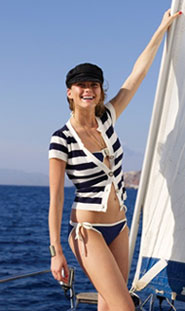
[Click Here]
to view our complete collection
of Greek
Fisherman Hats |
|
|
|
Watch Your Manners In Greece |
|
In the
Car |
|
Continued from November's issue...
- Where driving is concerned, Greece has its own
unique etiquette. Some identify cars with horsepower
and manpower, insisting that priority on the road is
only for fast cars. This is, of course, a
misconception. A good driver should have a
combination of common sense and respect towards road
rules.
- A car is not just a materialist's dream come true
nor a babe magnet for show-offs: it is a means of
transportation.
- For many people, a car is an extension of
themselves. The way we keep and drive our car is
closely related to our personality.
- Even though we feel private within our own car, we
must always remember that other people can invade
our privacy via the car's windows. So pastimes and
unpleasant habits indulged in while waiting at the
traffic light - such as picking one's nose or
displaying sudden erotic enthusiasm towards one's
companion - should be avoided. Of course, this is
even more true if we are actually driving.
- We should make sure our car is clean, with
spotless seats and no rubbish scattered over the
floor. This does not mean, however, that we should
take spend more time and energy caring for our car
than for our girlfriend. (It is, sadly, considered
very macho in Greece to spend ages soaping and
polishing one's car!).
- We shouldn't throw rubbish out of the window or
empty our ashtray onto the tarmac or the verge.
- If we damage a parked car, we should leave a note
with our name and phone number.
- If we hit a car, pedestrian or animal, we must
never abandon them and leave. We always stop and
exchange personal details when an accident has been
caused. In case of wounding, we always call and wait
for an ambulance to arrive.
- If we witness somebody hitting a car and driving
away, we should inform the car's driver.
- On a rainy day, we must try not to splash
pedestrians.
- We should only park where allowed. Not on double
yellow lines or at places where we hinder
pedestrians or other cars (double parking, over
pedestrian crossings). We also never park in front
of somebody's private garage, and we always leave
space between two cars, so they may easily leave.
- Pavements belong to pedestrians. Many drivers,
with the excuse that they do not want to bother
other vehicles' circulation, park on pavements. This
means that pedestrians are forced to walk in the
street, which puts their lives in danger. It also
inconveniences those trying to push a child's pram
or a wheelchair.
- We should leave space for other drivers,
especially when they are maneuvering to park. It is
unfair to honk and unnerve them.
- No matter how right or hot-tempered we are, we
shouldn't take revenge by damaging or crashing into
the car which has parked in front of our private
garage. We should call the police, who are the only
ones responsible for punishing law-breakers.
- There is no law stating that somebody must not
take over two parking spaces, however this is a most
selfish thing to do. What laws omit, good manners
indicate.
- We sound our horn sparingly, not with the aim of
terrorizing pedestrians or an indecisive driver
ahead of us who happens to be lost and hesitant.
Hooting is sometimes justifiably used, since many
people are absent minded, or are slow to set off
when the traffic light turns green. Where possible,
however, we should opt for merely flashing the
driver in front with our headlights.
- We shouldn't slam our car doors shut, nor honk in
inhabited areas or late at night.
- Often, instead of pulling in to the side of the
road, drivers sit in the middle of the street
hooting for their friends to come downstairs and get
into the car. This is pure bad manners, and it
spoils both our neighbor's peace and quiet and the
driver's own reputation.
- Even though there are certain rules regarding use
of headlights, it seems that drivers have invented
their own code. For example, if someone ahead of us
is driving slowly in the left-hand (fast) lane, we
blind him with our headlights so he will get the
message and change lane. When we want to indicate
that we have right of way, here we go again,
flashing our headlights. In general, we should not
leave our headlights full on, since they blind other
drivers and may cause an accident.
- At crossroads the car coming in from the right has
priority, unless a road sign indicates differently.
- Pedestrians, being more vulnerable, always have
priority, even if the car is moving legitimately
with a green light.
- We shouldn't use our mobile phones when driving
nor while at petrol stations, since this may cause
an accident.
- Athens has terrible traffic jams. However, this
doesn't give us the right continually to slalom from
one lane to another.
-
Remember that at roundabouts priority belongs to
those entering the roundabout. Those already on the
roundabout should stop and let oncoming drivers
pass, unless road-signs state otherwise.
Excerpt from "Watch Your Manners In Greece" by
Christos K. Zampounis
|
|
Special Feature:
Eastern Christmas
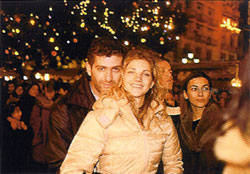 In
Greece, Orthodox Christians celebrate
Christmas by going to church and with
festive food. But there are no special
duties or lavish family reunions, even if
the obligatory giving of Christmas presents
has gradually found its way to Greece, as it
has all over the world. In some parts of
"Trace, special Christmas games have
developed. For instance, on December 24,
thirteen young men (rougatsades) walk
through the town singing, twelve of them
dressed as disciples, the thirteenth as
Christ himself. By way of thanks the young
men receive a financial reward, as they are
all just about to be called up for military
service. On the other hand, kalanta,
Christmas carols, no different from those of
Western Europe, are sung all over Greece.
Children go into shops and houses and wish
the owners a year full of blessings, and in
return they too are given money and candies.
On December 25, the only day when all the
family gets together, the galopoula, stuffed
turkey, is roasted in ovens everywhere, and
for dessert there are Greek Christmas
cookies, melomakarona (honey macaroons). In
Greece, Orthodox Christians celebrate
Christmas by going to church and with
festive food. But there are no special
duties or lavish family reunions, even if
the obligatory giving of Christmas presents
has gradually found its way to Greece, as it
has all over the world. In some parts of
"Trace, special Christmas games have
developed. For instance, on December 24,
thirteen young men (rougatsades) walk
through the town singing, twelve of them
dressed as disciples, the thirteenth as
Christ himself. By way of thanks the young
men receive a financial reward, as they are
all just about to be called up for military
service. On the other hand, kalanta,
Christmas carols, no different from those of
Western Europe, are sung all over Greece.
Children go into shops and houses and wish
the owners a year full of blessings, and in
return they too are given money and candies.
On December 25, the only day when all the
family gets together, the galopoula, stuffed
turkey, is roasted in ovens everywhere, and
for dessert there are Greek Christmas
cookies, melomakarona (honey macaroons).
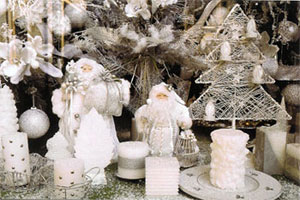 The
most important winter festival in Greece is
the New Year, beginning on New Year's Eve
with the New Year cake vasilopita. The first
festival on the Greek calendar is marked by
honoring St. Vasilios (Santa Claus), who
comes down to earth on that day. Vasilopita
can be made as a Madeira sponge or a puff
pastry cake with nuts, or in a savory
version with meat, and a coin is hidden in
the cake after baking. The cake is cut on
New Year's Eve, with all the family present.
The pieces are distributed in a
predetermined order: the first is for
Christ, the second for Mary, the third for
St. Vasilios, the fourth for the house, the
fifth for the head of the family, the sixth
for the mother, then one for each of the
children. A piece is also cut for each
absent member of the family. Whoever finds
the coin can look forward to special success
in the coming year. The
most important winter festival in Greece is
the New Year, beginning on New Year's Eve
with the New Year cake vasilopita. The first
festival on the Greek calendar is marked by
honoring St. Vasilios (Santa Claus), who
comes down to earth on that day. Vasilopita
can be made as a Madeira sponge or a puff
pastry cake with nuts, or in a savory
version with meat, and a coin is hidden in
the cake after baking. The cake is cut on
New Year's Eve, with all the family present.
The pieces are distributed in a
predetermined order: the first is for
Christ, the second for Mary, the third for
St. Vasilios, the fourth for the house, the
fifth for the head of the family, the sixth
for the mother, then one for each of the
children. A piece is also cut for each
absent member of the family. Whoever finds
the coin can look forward to special success
in the coming year.
Excerpt from:
"Culinaria
Greece" by Marianthi Milona
|
|
|
Don't Forget to Pick Up Your Greek
Christmas Ornaments!!
Order your Greek Christmas ornaments in
advance to
ensure product availability.
|
|
|
Recent
Arrivals and Christmas Gift Suggestions |
|
Featured New
Additions |
|

 
On May 20, 1941, more than 8,000 elite Nazi
paratroopers assaulted the civilian population of
the island of Crete. It was the largest Nazi
airborne operation of the war. Within 2 days, nearly
4,000 of the paratroopers were killed - more than
the entire number of German soldiers killed in the
war to that point.
Stunned by the relentless civilian fighting force of
men, women, and even children, over 10,000 German
reinforcements were quickly dispatched. Overwhelmed
Allied soldiers were soon forced to evacuate the
island, leaving Crete fated to a brutal German
occupation. But the subjugation of the Cretan people
- Hitler's true goal - would never be realized.
The 11th Day chronicles the stories of the men,
women, and children of the Cretan civilian
resistance movement and their relentless struggle
against Nazi occupation forces from 1941-1945.
Featuring rare, unpublished photographs and never
before seen film footage of the Battle of Crete,
these stories are told first hand and on-location,
through exclusive interviews with Cretan fighters
and veteran Allied soldiers and intelligence
operatives.
Narration in English or Greek. NTSC format.
|
 |
 |
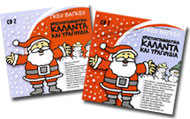
This Christmas, enjoy this 2CD Box Set full of fun
Christmas Songs in both English and Greek!!
|
|
|
|
Music &
DVDs |

Irini Merkouri, Argises
|

Kaiti Garbi, Pos Alazei o Kairos |

Elena Paparizou, The Game of Love |

Alkisti Protopsalti, Ammos
|

Giorgos Hristou, Gia na Doume |

Elli Kokkinou, Ki Allo CD + Bonus DVD |

Antonis & Yiannis Vardis, Oti Agapisame
|

Zafiris Melas, LIVE |

Kostas Makedonas, Pame Makria |

Peggy Zina, Ena |

Angela Dimitriou, Oxigono
|

Thanos Petrelis, Karaoke DVD (PAL) |

It's All Greek to Me, Angelo Tsarouchas DVD (NTSC) |

Gorgones and Magkes DVD (NTSC) |

Gambros Ap'to Londino DVD (NTSC) |
|
|
Books |

Book of Magic - Vivlio Mageias by Mara Meimaridi, In
Greek |

Treis aiones mia zwi by Zoi Haidemenou, In Greek
|

Aishatoi Kairoi by Anastasia Kalliotzi, In Greek
|

Pes pwt itan Oneiro by Anastasia Kalliotzi, In Greek
|

O Christos Ksanastavronetai by Nikos Kazantzakis, in
Greek
|

O ksakoustos Tsitsanis by Sotos Alexiou, In Greek
|

Mirodies kai gefseis tis Polis...kai stin korfi kanela -
Politikes Syntages, by Voula Halkousi , In |

Psomi ( Bread ) by Efi Voutsina, In Greek |

Edesmatologion Smirnis, by Efi Grigoriadou - Authentic
Recipes from Smyrna, In Greek |

The Most Beautiful Stories for Christmas and New Year's
Eve, in Greek
|
|
|
More
Additions! |
|
|
|
Featured Destination: Dilos |
|
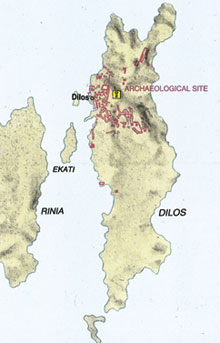 In
ancient times a sacred isle, birthplace of Apollo, Delos
now attracts myriads of visitors, all coming to marvel
at its monuments. Nowadays uninhabited and very close to
Mykonos (3.5 nautical miles from its westernmost
headland) there is a daily boat service with it. In the
summer caiques making excursions from other Cycladic
islands also call here. A small canal separates it from
the island of Rheneia. In
ancient times a sacred isle, birthplace of Apollo, Delos
now attracts myriads of visitors, all coming to marvel
at its monuments. Nowadays uninhabited and very close to
Mykonos (3.5 nautical miles from its westernmost
headland) there is a daily boat service with it. In the
summer caiques making excursions from other Cycladic
islands also call here. A small canal separates it from
the island of Rheneia.
Delos was known as Ortygia in antiquity and, according
to myth, Leto sought refuge here, escaping the wrath of
Hera, and gave birth to Apollo and Artemis.
Archaeological evidence attests that the island was
inhabited as early as 3000 B.C. In Mycenaean times a
settlement existed on the west side where there was also
a shrine to a female deity. It seems that the Ionian
colonizers who arrived in around 1000 BC introduced the
cult of Apollo, god of light and music. From the 9th
century BC Delos became the centre (political and
religious) of an Amphictyony of Ionians living in the
Aegean islands, under the hegemony of Naxos. In the 6th
century BC the Athenians joined this Amphictyony, on the
pretext of their Ionian provenance. After the end of the
Persian Wars (478 BC) Delos became the center of the
Athenian/Delian League and it was here that the
representatives of the League's members met annually to
confer. The common treasury of their contributions was
also kept here until 454 BC when it was transferred to
Athens. In 426 BC the island was cleanse( or purified,
the bones of the dead remove( from their graves and
deposited on the neighboring island of Rheneia. Thence
forth it was forbidden to give birth or die on Delos.
When the successors of Alexander the Great cam( into the
ascendancy Athenian influence on the island was
displaced and it became independent, the centre of
diverse alliances under the Macedonians, Egyptians and
Rhodians. In 16( BC the Roman Senate passed a decree
placing Delos once again under the aegis of Athens. In
88 BC it was laid waste by Mithnidates, it: monuments
destroyed and its population o' some 20,000 souls
decimated. Close on it,, heels, in 69 BC, came a new
disaster from which the island never recovered,
remaining deserted, a haven for corsairs. In 1872 the
French Archaeological School began systematic
excavations there, which still continuo today.
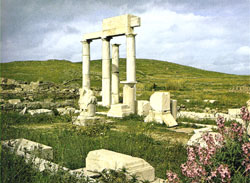 Delos
is a vast archaeological site extending from its west
side, which was the sacred harbour in ancient times. On
the northwest side are the Propylaea and Agora of the
Competaliasts or Hermaists, founded in the 2nd century
BC and used by Roman merchants and freed slaves.
Immediately beyond is the Sacred Way with bases for "ex
votos". To the west stood the large Stoa of Philip,
built in around 210 BC and opposite this is the
so-called South Stoa (3rd century BC) and South Agora or
Agora of the Delians. The Sanctuary of Apollo was
located northeast of the Stoa of Philip, consisting of
three temples dedicated to the god, of which the
foundations of the third, the "temple of the Athenians",
are nowadays visible. A little before the temple of
Apollo stood the Oikos of the Naxians (6th century BC)
and the Stoa of the Naxians (mid-6th century BC), to the
north the Horn Altar (Keratinos) and northeast the
temple of Artemis, built in the 2nd century BC upon the
ruins of a previous temple of the 7th century BC. On the
north side of the temple of Apollo were the so-called
Treasuries and east of these the Prytaneion (mid-5th
century BC). Southeast of this was the altar of Zeus
Soter, protector of seafarers and, on the north side the
temple of Dionysos (early 3rd century BC) and the Stoa
reputedly founded by Antigonos Gonatas at the end of the
3rd century BC. To the west were diverse buildings, the
Ekkiesiasterion where the Boule of the Deme of the
Delians met and the Thesmophoreion, a 5th century
edifice associated with the cult of Demeter. Situated on
the north side of the sanctuary, in the quarter of the
lake, was the Agora of Theophrastus, the Sanctuary of
the Twelve Gods of Olympus, the Delos
is a vast archaeological site extending from its west
side, which was the sacred harbour in ancient times. On
the northwest side are the Propylaea and Agora of the
Competaliasts or Hermaists, founded in the 2nd century
BC and used by Roman merchants and freed slaves.
Immediately beyond is the Sacred Way with bases for "ex
votos". To the west stood the large Stoa of Philip,
built in around 210 BC and opposite this is the
so-called South Stoa (3rd century BC) and South Agora or
Agora of the Delians. The Sanctuary of Apollo was
located northeast of the Stoa of Philip, consisting of
three temples dedicated to the god, of which the
foundations of the third, the "temple of the Athenians",
are nowadays visible. A little before the temple of
Apollo stood the Oikos of the Naxians (6th century BC)
and the Stoa of the Naxians (mid-6th century BC), to the
north the Horn Altar (Keratinos) and northeast the
temple of Artemis, built in the 2nd century BC upon the
ruins of a previous temple of the 7th century BC. On the
north side of the temple of Apollo were the so-called
Treasuries and east of these the Prytaneion (mid-5th
century BC). Southeast of this was the altar of Zeus
Soter, protector of seafarers and, on the north side the
temple of Dionysos (early 3rd century BC) and the Stoa
reputedly founded by Antigonos Gonatas at the end of the
3rd century BC. To the west were diverse buildings, the
Ekkiesiasterion where the Boule of the Deme of the
Delians met and the Thesmophoreion, a 5th century
edifice associated with the cult of Demeter. Situated on
the north side of the sanctuary, in the quarter of the
lake, was the Agora of Theophrastus, the Sanctuary of
the Twelve Gods of Olympus, the
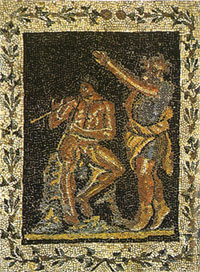 Temple
of Leto and the Agora of the Italians. A road led from
the temple of Leto and north of the Sacred Lake to the
famous Avenue of the Lions, votive of the Naxians in the
7th century BC. Only five of the original seven lions
are still extant. At a slightly lower level lay the
Sacred Lake on which the swans of Apollo swam in
antiquity and which was filled in with earth following
an outbreak of malaria in 1926. Northwest of the Avenue
of the Lions was the Koine of the Poseidonists of
Beirut, centre of merchants who worshipped Poseidon, two
palaestrae, the sanctuary of Archegetes, the Gymnasium
and the Stadium. The quarter of the Theatre, to the
south of the Sanctuary was the major residential area
and the houses of the Hellenistic and Roman periods were
decorated with mosaics. From here one can easily reach
the museum in which finds from the excavations on the
island are housed. To the east of the Theatre quarter
are remnants of various structures, while a road leads
to the eminence of Kynthos, on the summit of which Zeus
and Athena were worshipped. Northwest of the House of
the Masks are remnants of the ancient Theatre (17 to 26
tiers of seats), which had a capacity of 5,500
spectators and was built in the 2nd century BC. Temple
of Leto and the Agora of the Italians. A road led from
the temple of Leto and north of the Sacred Lake to the
famous Avenue of the Lions, votive of the Naxians in the
7th century BC. Only five of the original seven lions
are still extant. At a slightly lower level lay the
Sacred Lake on which the swans of Apollo swam in
antiquity and which was filled in with earth following
an outbreak of malaria in 1926. Northwest of the Avenue
of the Lions was the Koine of the Poseidonists of
Beirut, centre of merchants who worshipped Poseidon, two
palaestrae, the sanctuary of Archegetes, the Gymnasium
and the Stadium. The quarter of the Theatre, to the
south of the Sanctuary was the major residential area
and the houses of the Hellenistic and Roman periods were
decorated with mosaics. From here one can easily reach
the museum in which finds from the excavations on the
island are housed. To the east of the Theatre quarter
are remnants of various structures, while a road leads
to the eminence of Kynthos, on the summit of which Zeus
and Athena were worshipped. Northwest of the House of
the Masks are remnants of the ancient Theatre (17 to 26
tiers of seats), which had a capacity of 5,500
spectators and was built in the 2nd century BC. |
|
|
|
Travel
& Museum
Guides for your trip in the area |

Around Greece in 80 Stays by Jacoline Vinke |

Alistair Sawday's Special Places to Stay - Greece |

Cyclades : Discovering the Greek Islands of the Aegean |

Athens - History, Momuments, Museums (in English) |

National Museum - Illustrated Guide to the Museum (in
English) |
| |
|
Saints'
Name days in December |
|
Monday |
Tuesday |
Wednesday |
Thursday |
Friday |
Saturday |
Sunday |
|
|
|
|
|
1
Theoklitou |
2
Muropis |
3 |
4
Varvaras |
5
Savva |
6
Nikolaou |
7
Amvrosiou |
8 |
9
Agias Annis |
10 |
|
11 |
12
Spuridonos |
13
Eustratiou /
Loukias |
14 |
15
Eleutheriou |
16 |
17
Daniel /
Dionysiou
Zakunthou
|
18
Sevastianou &
Zois |
19
Aglaias |
20
Ignatiou |
21
Themistokleous |
22
Anastasias |
23 |
24
Eugenias |
25
CHRISTMAS DAY |
26
Emmanouil /
Synaksi
Theotokou |
27
Stefanou |
28 |
29 |
30 |
31 |
|
|
Icons
depicting the celebrated Saint, make great gifts for
namedays.
Shop among our great collection of icons at our
store. Also available, namedays, birthday, holiday, and
special occasion greeting cards.
|
|
Share
With Others!!!! |
Let your family and friends share the savings by
forwarding them this email.
|
|
Suggestions
& Comments |
Dear Greekshops.com customer,
Thank you for contributing to our effort to bring
unique and hard to find Greek products to your home. We
value your opinion, so please let us know if you have
any concerns, suggestions, comments that will improve
and help us grow. Send us your feedback at:
[email protected]
|
|
Subscription
Information |
|
Missed an issue of our
newsletter? Now you can access past newsletters by
visiting
http://www.greekshops.com/newsletters_archive
To
unsubscribe from our mailing list,
click here
|
|
|
|

